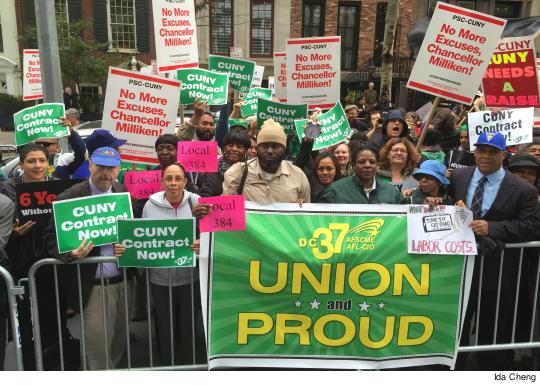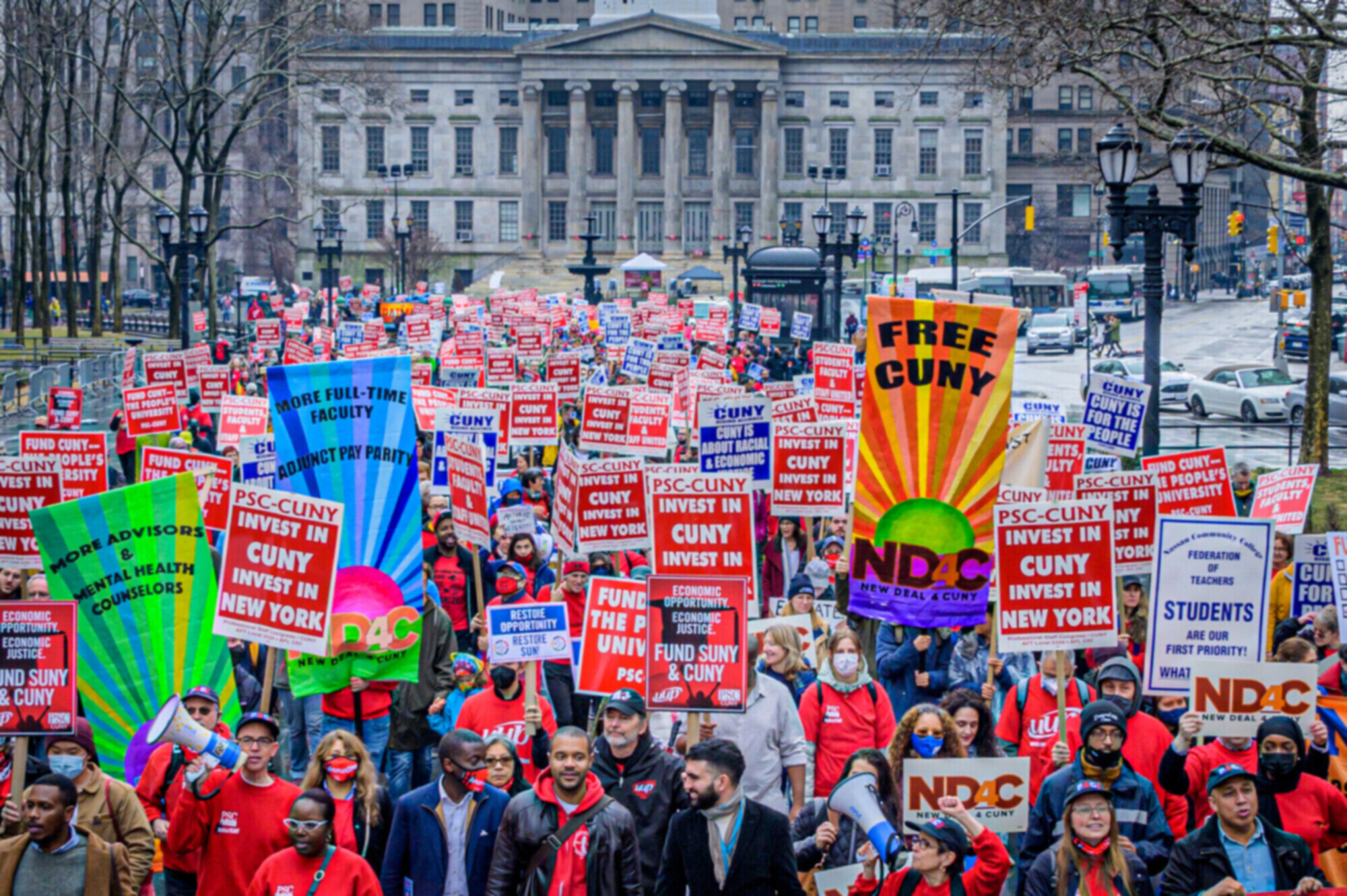Across the nation on November 10, workers at the lowest end of the pay scale launched a series of rallies that organizers of the Fight for $15 movement say represented their biggest turnout yet. The union-backed campaign unites workers across industries – from home health care to fast food, transportation to child care – in an effort to increase the federal minimum wage to $15 per hour. Counted among those at the New York City Foley Square rally were CUNY workers represented by DC 37, at least 7,000 of whom make less than $15 per hour, according to the union’s Public Employee Press.
 |
Many of the University’s college assistants and custodians earn less than $15 an hour, on top of which, these DC 37 CUNY workers haven’t seen a raise for more than seven years. Members of the PSC, which represents some of the low-wage CUNY workers, have gone without a raise for six years.
A Phased Increase
Adjunct faculty members often feel a kinship with the University’s low-wage workers. “The one thing that ties us together [is] that we’re all selling our labor,” said Michael Batson, an adjunct lecturer at the College of Staten Island, in an interview with Clarion. The yearly pay for a beginning adjunct with a full course load is around $25,000, according to the CUNY Adjunct Project, an advocacy group.
Batson, a member of the PSC bargaining team, was a featured speaker at the Fight for $15 rally, where he made the connection between adjunct compensation and the low wages of other workers, and spoke of the need to build solidarity across sectors.
“Our students depend on CUNY to provide a top-rate education,” he told the crowd. “CUNY can’t continue to provide that education without the best faculty and staff.”
On the day that Fight for $15 rallies took place throughout the state, Governor Andrew Cuomo announced a phased increase in the minimum wage to $15 per hour for public employees of the New York State government. The new rate will benefit roughly 1,000 workers in New York City. According to a press release issued by the governor’s office, it is scheduled to go into effect citywide by the end of 2018, and statewide by July of 2021. (A CUNY spokesperson contacted by Clarion did not specify whether CUNY employees would be affected, but the estimate given by the governor’s office appears to be too small to cover the thousands of CUNY employees who make less than $15 an hour.)
A statement from New York State AFL-CIO President Mario Cilento, released the same day as the governor’s announcement, lauded Cuomo’s move, saying, “We thank the governor for his leadership and for making social and economic justice for all workers a top priority.”
But left out of the governor’s equation are many who work at CUNY, and DC 37 is pressing hard to see them included. On December 11, Cuomo vetoed a “maintenance of effort” bill that would have funded salary increases in 2016.
“Mr. Cuomo doesn’t feel like we need [a raise], evidently,” said Eric Miles, a custodial assistant at Queens College. He’s held the job for more than 30 years, he told Clarion, and earns around $14 an hour. “The pay sucks,” said Miles, a member of the DC 37 Local 1597. “I mean the benefits are great, but you can’t pay for anything with benefits.” Morale in his department is low, he said, as the college tries to make do with fewer workers.
“I want a raise now…for all of us, not just my department,” Miles said. “Everybody in the CUNY family needs a raise.”
Meleny Perez, a program assistant at the Adult Learning Center at New York City College of Technology, is one of about 80 Research Foundation workers represented by the PSC who earns less than $15 an hour. She’s working full-time at CUNY, and makes around $12.50 an hour. She is one of the many who are not covered under the governor’s $15-per-hour plan.
“I am very underpaid for what I do,” Perez told Clarion. She says that a program assistant is generally expected to do clerical tasks, but she picks up additional responsibilities, such as managing the database, grading tests and helping with Spanish translation.
Low Pay at CUNY
Perez doesn’t intend to remain in this predicament; she is studying for a bachelor’s degree in computer information at City Tech, paying for her tuition and her living expenses with her paltry salary. Her rent recently doubled due to an error by her landlord, she says, but she’s stuck with the increase until she is granted a hearing by the NYC Housing Authority. Consequently, she makes ends meet, she says, by juggling three credit cards. If she can put together enough money to make her spring tuition payment, she should graduate this June.
“I’m trying to find a way, pretty much,” Perez said.
Batson, who is also a member of the PSC Executive Council, sees in the Fight for $15 the same values embraced by the PSC and DC 37 as the unions fight for contracts that include raises that take into account the rate of inflation and other conditions lived by the workers of New York City.
“We all need to stick together [in order] to improve both wages and the conditions of our labor,” he told Clarion.

